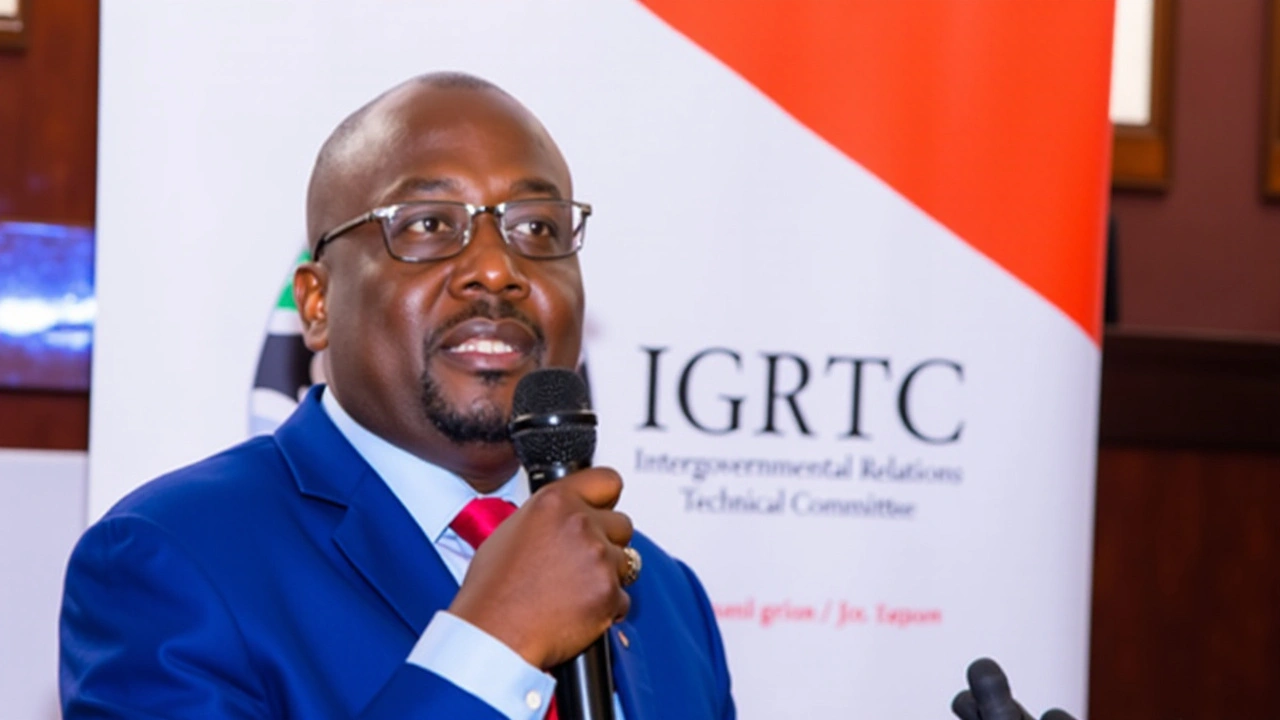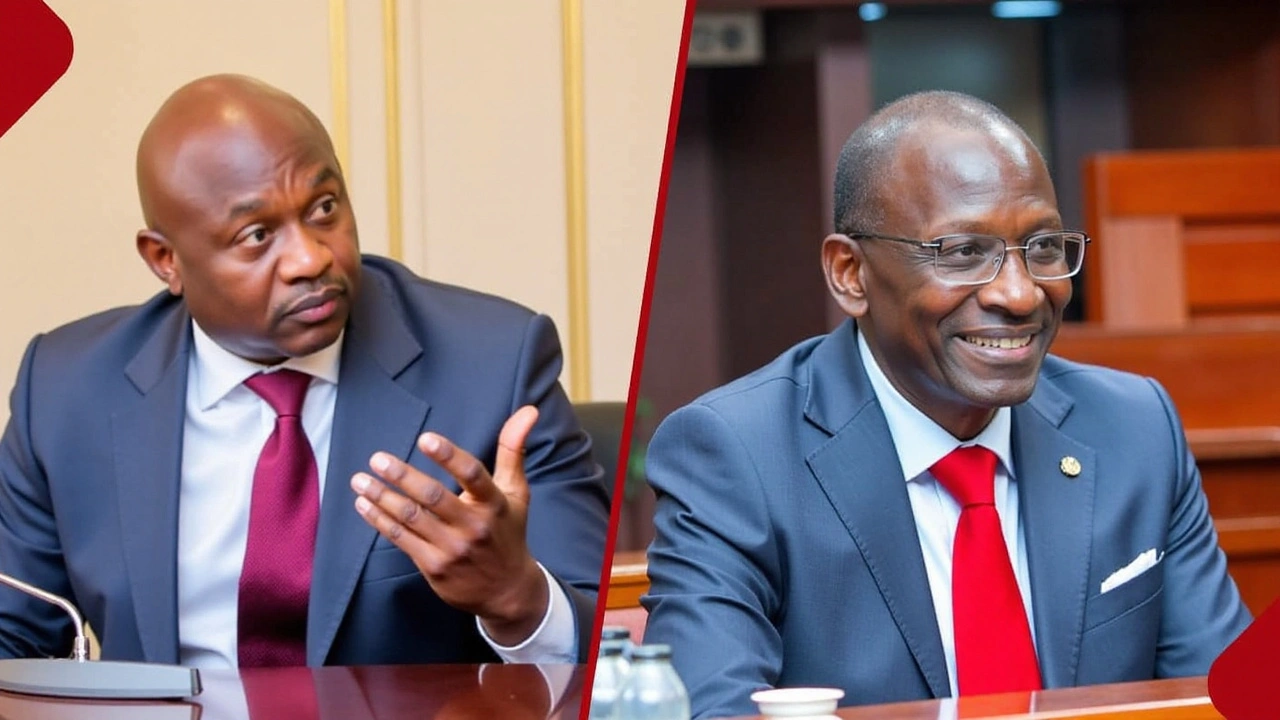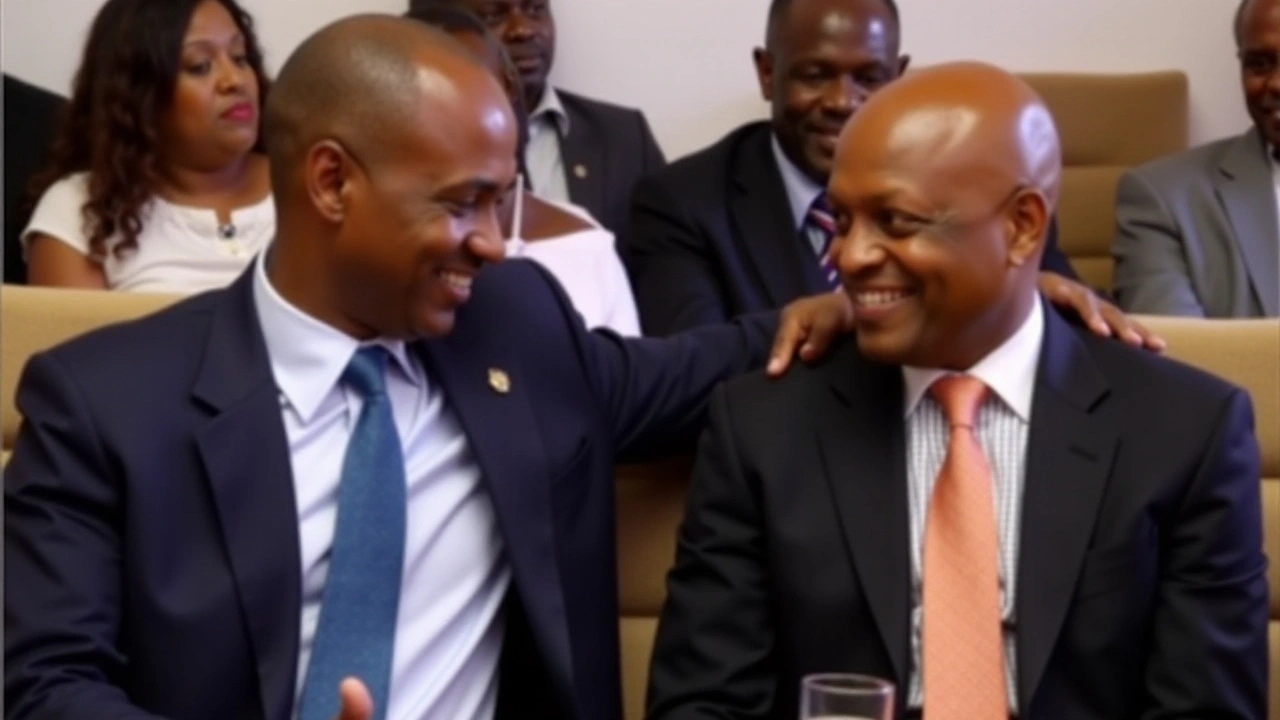Moses Kuria’s Claim of Strategizing President Ruto's Government
In a revealing disclosure, Former Public Service Cabinet Secretary Moses Kuria has taken credit for the strategic formation of President William Ruto’s so-called 'broad-based' government. According to Kuria, he advised the Kenyan President to include figures from the opposition in his administration. This move was conceived long before national unrest and protests, driven largely by the nation's younger generation, had erupted.
Anticipating Unrest and Pushing for Inclusion
Kuria, who was deeply involved in Kenya's political landscape, said that he had warned President Ruto about potential unrest within the Orange Democratic Movement (ODM) and anticipated internal power struggles within the ruling coalition, Kenya Kwanza. He foresaw possible destabilizing events and counseled the President to integrate opposition members into the government as a preemptive measure.
Lobbying Key Opposition Figures
In a bold political maneuver, Kuria lobbied senior opposition figures, including former Minority Leader Opiyo Wandayi, former Mombasa Governor Hassan Joho, and ODM stalwart Oburu Odinga, encouraging them to accept Cabinet positions. Kuria even revealed his readiness to make a trip to Dubai to persuade Raila Odinga, the opposition leader, to join the inclusive government. Such efforts culminated in significant appointments.

Key Appointments and the Political Shift
The nation's political landscape saw some profound changes as Hassan Joho was appointed as Cabinet Secretary for Mining, Blue Economy, and Maritime Affairs, Wycliffe Oparanya became Cabinet Secretary for Cooperatives, John Mbadi took the helm at the National Treasury, and Opiyo Wandayi was appointed head of the Energy and Petroleum Ministry. These appointments represented a major shift in Kenya's governance.
National Unrest and the Quest for Stability
The motivation behind this inclusive government seemed to be Ruto's initiative to quell the civil unrest that had nearly paralyzed the nation. The streets of major cities were overrun with protesters expressing their dissatisfaction with the economic conditions and political appointments. Despite these efforts, the young populace participating in these demonstrations voiced their disapproval of any unity government.
Kuria's Perspective on National Stability
Moses Kuria framed his actions as visionary and necessary for the country's future. He emphasized that integrating opposition members into higher government echelons was critical for maintaining national stability. He believed that by inviting opposition figures into the ruling framework, it was possible to foster an environment of collaboration and reduce political tensions.

The Broader Implications of an Inclusive Government
This political development carries broader implications for Kenya’s democratic process. It highlights the necessity of cross-party collaboration in the face of national crises. By creating a more inclusive government, President Ruto and his advisors, like Kuria, aimed to strengthen the nation's democratic institutions and address the growing concerns of disenchantment among the youth and other demographics.
Looking Forward: Stability Versus Popular Opinion
As Kenya moves forward, the effectiveness of this broad-based government in addressing national issues remains to be seen. The country's socio-political fabric is complex, and while some may view this as a masterstroke of political prudence, others see it as a compromise on principles. The actual impact on peace and national unity will unfold in the coming years, as the inclusive government tackles both internal and external challenges.
Conclusion
Moses Kuria's claims have certainly added a new dimension to Kenya’s contemporary political narrative. Whether his strategic counsel will yield long-term stability or face resistance from various facets of society is a question Kenyan citizens and political analysts will continue to debate. Nonetheless, this move illustrates a significant chapter in Kenya's ongoing voyage towards a more inclusive and resilient governance structure.

Anita Drake
August 13, 2024 AT 20:39It's encouraging to see a leader acknowledge the need for broader representation. Inclusivity can help bridge the divide between the ruling coalition and the opposition, especially when the youth are restless. By bringing in diverse voices, the government may gain legitimacy and reduce the risk of protests. Still, the real test will be whether these appointments translate into genuine policy influence. I hope this move fosters dialogue rather than just being a symbolic gesture.
Eduardo Lopez
August 14, 2024 AT 05:16Honestly, what we’re witnessing is a classic case of political theater. Kuria’s claims sound like a self‑congratulatory script written after the fact, trying to rewrite history in his favor. The drama around an “inclusive” cabinet is just that – drama, not substance. If the president truly cared about the nation’s future, he’d focus on delivering results, not on crafting narratives. Still, I’ll give credit for the flair; it does keep the conversation lively.
Nancy Perez de Lezama
August 14, 2024 AT 13:53The pitch feels like political theater rather than genuine reform.
Matt Heitz
August 14, 2024 AT 22:29While the rhetoric of inclusion sounds noble, the underlying power dynamics remain unchanged. Kuria’s maneuvering merely reallocates patronage to maintain elite cohesion, a classic coalition‑maintenance strategy. By co‑opting opposition figures, the ruling bloc secures parliamentary stability without addressing systemic grievances.
Susan Mark
August 15, 2024 AT 07:06From a governance perspective, integrating opposition members can improve policy checks and balances. It allows for a broader range of expertise, especially in ministries like Energy and Mining where technical knowledge is crucial. Historically, Kenyan coalitions that have shared power have seen smoother legislative processes. Of course, the effectiveness depends on the willingness of all parties to collaborate beyond partisan interests.
Jason Jennings
August 15, 2024 AT 15:43All that sounds nice on paper, but we all know politics in Kenya is still about who’s got the biggest bribe. These appointments won’t change the fact that corruption is still the norm.
Diego Vargas
August 16, 2024 AT 00:19Kuria’s role kinda reminds me of the old power brokers from the 90s who shuffled ministers to keep their own networks alive. Kenya’s multi‑party system often sees behind‑the‑scenes deals that are more about loyalty than competence. By bringing in ODM heavyweights, Ruto might be securing his parliamentary majority, not necessarily solving the youth’s economic frustrations. The inclusion of Joho and Wandayi could also be a tactical move to split opposition votes in upcoming elections. Historically, such coalition‑building has been a double‑edged sword for stability.
Alex Lee
August 16, 2024 AT 08:56This is just a power grab.
Vida Yamini
August 16, 2024 AT 17:33Looking at the broader picture, the attempt to create a ‘broad‑based’ government can be seen as a strategic response to mounting societal pressures; the youth are restless, the streets are echoing with discontent, and the economic landscape is riddled with challenges that demand collective problem‑solving. By reaching out to opposition leaders, the administration is signaling a willingness to listen, yet the depth of this willingness remains to be proven; token appointments may not be sufficient to quell the underlying frustrations. Historically, when governments have genuinely shared power, there has been a measurable decline in civil unrest, as the sense of representation fosters a more collaborative political climate. However, the real impact will depend on how much authority these newly appointed figures actually wield; if they are confined to ceremonial roles, the inclusive narrative may quickly unravel. Moreover, the inclusion of high‑profile opposition members could serve to legitimize the administration in the eyes of international partners, potentially unlocking economic aid and investment that the country desperately needs. On the flip side, critics argue that this approach could dilute policy coherence, leading to gridlock if divergent agendas clash without a clear mechanism for resolution. The balance between unity and effectiveness is delicate, especially in a nation as diverse as Kenya, where ethnic and regional interests intersect with political affiliations. It is also worth noting that Ruto’s move may be pre‑emptive, aiming to neutralize potential dissent before it escalates into more organized opposition. In this context, the role of individuals like Kuria becomes pivotal, as they orchestrate the behind‑the‑scenes negotiations that shape the final composition of the cabinet. The inclusion of Joho in the Mining and Blue Economy portfolio, for instance, could bring valuable expertise to a sector that holds significant growth potential for the Kenyan economy. Yet, the success of such appointments will hinge on the transparency of the decision‑making process and the willingness of both sides to compromise on key policy initiatives. Ultimately, while the inclusive government concept carries promise, its execution will determine whether it serves as a genuine bridge across party lines or merely a façade to mask deeper political calculations. Only time will reveal if this coalition can navigate the complex terrain of governance, maintain stability, and earn the trust of a skeptical populace.
James Lawyer
August 17, 2024 AT 02:09Vida raises several important points about the potential benefits and pitfalls of such a coalition. The historical evidence she cites aligns with the notion that inclusive cabinets can reduce unrest, provided they are granted genuine authority. It will indeed be crucial to monitor whether the opposition members receive more than symbolic portfolios and whether policy coherence can be maintained.
Abby Culbertson
August 17, 2024 AT 10:46I feel a bit uneasy about this whole deal; it seems like a lot of promises with little real change.
Awolumate Muhammed Abayomi
August 17, 2024 AT 19:23Don't lose hope! Even small steps towards cooperation can pave the way for bigger progress, so keep the faith and stay engaged.
Josh Tate
August 18, 2024 AT 03:59I get the mixed feelings many are having. On one hand, any effort to bring people together is a positive sign; on the other, the real test will be in the implementation. Let’s see if the policies that follow truly address the concerns of the younger generation.
John Smith
August 18, 2024 AT 12:36Sure, let’s just hand out titles and hope everyone behaves. Sounds like a recipe for more drama.
Alex Soete
August 18, 2024 AT 21:13Regardless of the doubts, this could be a turning point if both sides commit to real collaboration. It’s an opportunity for Kenya to showcase how diverse voices can shape policy. I’m hopeful that constructive dialogue will emerge and that citizens will feel more represented.